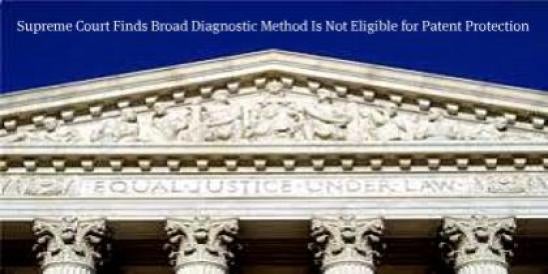In a case closely-watched by the biotechnology, diagnostic, and pharmaceutical industries, particularly those interested in companion diagnostics and personalized medicine, the Supreme Court found that a broad diagnostic method was not eligible for patent protection. The case is Mayo Collaborative Services v. Prometheus Labs., Inc., Case No. 10-1150 (Mar. 20, 2012).
Prometheus holds patents on the treatment of auto-immune diseases, such as Crohn’s disease or ulcerative colitis, through the use of thiopurine drugs. Patients’ reactions to thiopurine drugs vary, so it is important to determine the proper dose for each patient. Prometheus’ patents claimed methods of administering a thiopurine compound, determining the level of the drug’s metabolites in the patient’s blood, and identifying ranges in which the drug would be effective yet non-toxic. The proper dose for a patient was one that produced metabolites with the claimed ranges. Mayo had been purchasing diagnostic tests from Prometheus, but decided to create its own and challenge the patents.
The Court’s opinion begins with a discussion of the competing principles that determine the eligibility of a specific claim for patent protection. On the one hand, “[t]he Court has long held that . . . ‘laws of nature, natural phenomena, and abstract ideas’ are not patentable.” Slip op. at 1. On the other hand, “[t]he Court has recognized … that too broad an interpretation of this exclusionary principle could eviscerate patent law. For all inventions at some level embody, use, reflect, rest upon, or apply laws of nature, natural phenomena, or abstract ideas.” Id. at 2. Accordingly, “an application of a law of nature or mathematical formula to a known structure or process may well be deserving of patent protection.” Id.(emphasis in original; quoting Diamond v. Diehr, 450 U. S. 175, 187 (1981)).
Against this background, the Court’s opinion described the issue as whether “the patent claims add enough to their statements of the correlations to allow the processes they describe to qualify as patent-eligible processes that apply natural laws?” Id. at 8 (Court’s emphasis). The Court proceeded to answer this question by examining each step of the claim. As to the administering step, the Court wrote that it
"simply refers to the relevant audience, namely doctors who treat patients with certain diseases with thiopurine drugs. That audience is a pre-existing audience; doctors used thiopurine drugs to treat patients suffering from autoimmune disorders long before anyone asserted these claims. In any event, the “prohibition against patenting abstract ideas ‘cannot be circumvented by attempting to limit the use of the formula to a particular technological environment.’” Id. at 9.
The “determining” step “tells the doctor to determine the level of the relevant metabolites in the blood, through whatever process the doctor or the laboratory wishes to use. As the patents state, methods for determining metabolite levels were well known in the art.” Id. at 10. The “wherein” steps “simply tell a doctor about the relevant natural laws, at most adding a suggestion that he should take those laws into account when treating his patient.” Id. at 9. The combination of the steps “adds nothing,” id. at 10, leading to the conclusion that that the claims were not eligible for patent protection because “the claims inform a relevant audience about certain laws of nature; any additional steps consist of well understood, routine, conventional activity already engaged in by the scientific community.” Id. at 11.
Early in its opinion, the Court was careful to note that its “conclusion rests upon an examination of the particular claims before us in light of the Court’s precedents.” Id. at 3. Thus, one should not leap to the conclusion that the sky is falling on any of the affected industries. Only time and further case law development, or potentially Congressional intervention, will determine the significance of the decision.
Those interested in reading the entire decision can find a copy here.


 i
i

